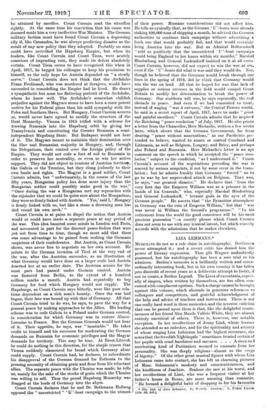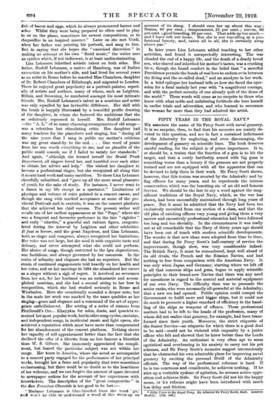LIZA LEHMANN.* DifusraArTs do not as a rule shine in
autobiography. Beethoven never attempted it ; and a recent critic has denied him the power of literary expression. That gift Wagner undoubtedly possessed, but his autobiography has been a sore trial to his admirers. Berlioz's memoirs is a brilliantly written and extraordinarily interesting book, but in his own country it has fallen into discredit of recent years as a deliberate attempt to foster, if not to create, a Berlioz Legend. The Lives of executants, especially of singers, when written by themselves, are too often consumed with complacent egotism. Such a charge cannot be brought against this volume, which abounds in generous references to colleagues and competitors, and grateful acknowledgment of the help and advice of teachers and instructors. There is not one really hard word in these memories, and the severest criticism that can be passed upon them is that, like the delightful reminiscences of her friend Miss Maude Valerie White, they are almost entirely uncritical of others. There is, however, ono notable exception. In her recollections of Jenny Lind, whose lessons she attended as an onlooker, and for the spirituality and artistry of whose singing Liza Lehmann had the highest reverence, she notes that the Swedish Nightingale " sometimes treated certain of her pupils with cruel harshness and sarcasm. . . . A stern and unrelenting kind of Puritanism seemed to emanate from her personality. She was deeply religious—almost to the verge of bigotry." Of the other great musical figures with whom Liza Lehmann came into contact, she has left us charming pictures of Mme. Schumann's modesty and conscientiousness, and the kindliness of Joachim. Brahma she saw at his worst, and her recollections of Liszt, who was a frequent visitor at her father's house in Rome, are more amusing than romantic. " He formed a delightful habit of dropping in for his favourite
dish of bacon and eggs, which he always pronounced beacon and aches. Whilst they were being prepared he often used to play to us on the piano, sometimes his newest compositions, or to rhapsodize in an inspired manner." Later on she met Verdi, when her father was painting his portrait, and sang to him. But in saying that she hopes she " exercised discretion " in making no attempt at his own " florid music," the writer uses an epithet which, if not indiscreet, is at least undiscriminating.
Liza Lehmann inherited artistic talent on both sides. Her father, Rudolf Lehmann, a native of Hamburg, was of Italian extraction on his mother's side, and had lived for several years as an artist in Rome before he married Miss Chambers, daughter of Dr. Robert Chambers of Edinburgh, and migrated to London. There he enjoyed great popularity as a portrait-painter, especially of artists and authors, many of whom, such as Leighton, Millais, and Browning, he numbered amongst his most intimate friends. Mrs. Rudolf Lehmann's talent as a musician and artist was only equalled by her invincible diffidence. Her skill with the brush is happily illustrated by a beautiful profile drawing of the daughter, in whom she fostered the ambitions that she so sedulously repressed in herself. Mrs. Rudolf Lehmann —the "A. L." of so many charming arrangements of old songs— was a relentless but stimulating critic. Her daughter had many teachers for the pianoforte and singing, but " during all the nine years that I sang in public my mother's criticism was my great stand-by to the end. . . . One word of praise from her was worth everything to me, and no plaudits of the public could console me if I failed to satisfy her standards." And again, " althotigh she termed herself the Brutal Truth Department, all singers loved her, and tumbled over each other to obtain her advice and help." She wished her daughter to become a professional singer, but she recognized all along that it meant hard work and many sacrifices. To these Liza Lehmann cheerfully submitted, and "gave up all the more usual pleasures of youth for the sake of study. For instance, I never went to a dance in my life except as a spectator." Limitations of physique and volume of voice pointed to a concert career, and though she sang with marked acceptance at some of the provincial Festivals and in oratorio, it was on the concert platform that she achieved her chief success. The present writer well recalls one of her earliest appearances at the "Pops," where she was a frequent and favourite performer in the late " eighties " and early " nineties," a graceful and radiant figure, congratulated during the interval by Leighton and other celebrities. Il faut se borner, said the great Napoleon, and Liza Lehmann, both as singer and composer, always recognized her limitations. Her voice was not large, but she used it with exquisite taste and delicacy, and never attempted what she could not perform. Her choice of songs, though restricted to the lyre eleganti arum, was fastidious, and always governed by her resources. In the realm of urbanity and elegance she had no superiors. But the strain of continued engagements told heavily on her health and her voice, and on her marriage in 1894 she abandoned her career as a singer without a sigh of regret. It involved no severance from her art, for her husband was an enthusiastic and accomplished musician, and she had a second string to her bow in composition, which she had studied seriously in Rome and Wiesbaden. Here she occasionally sounded a deeper note, but in the main her work was marked by the same qualities as her singing—grace and elegance and a command of the art of appropriate embellishment. Her setting of a series of stanzas from FitzGerald's Oma, Khayyam for solos, duets, and quartets remained her most popular work, but in other song-cycles, cantatas, and independent songs, in incidental music and light opera, she achieved a reputation which must have more than compensated for her abandonment of the concert platform. Nothing shows her capacity of self-appraisement better than the fact that she declined the offer of a libretto from no less famous a librettist than W. S. Gilbert. She immensely appreciated the compliment, but feared the particular subject was not within her range. Her tours in America, where she acted as accompanist to a concert party engaged for the performance of her principal works, brought her a fame and popularity that were sometimes embarrassing, but there could be no doubt as to the heartiness of her welcome, and we can forgive the amount of space devoted to newspaper notices for the account of her experiences with interviewers. The description of the " great composerine " in the Nan Francisco Ohroniek is too good to be lost : " Madame Lehmann is blue-blooded from the word ' go,' and won't be able to understand a word of this write-up on
account of its slang. I should sum her up about this way Brains, 80 per cent. ; temperament, 25 per cent. ; nerves, 60
per cent. ; good , 99 per cent. That adds up too much— and I have left out loo . But she is not travelling as a professional beauty, and, taken all in all, she is certainly away above par."
In later years Liza Lehmann added teaching to her other activities, and found it unexpectedly interesting. The war clouded the end of a happy life, and the death of a dearly loved son, who shared and inherited his mother's tastes, was a crushing blcw, though she found comfort in the belief that " a merciful Providence permits the bonds of real love to endure even between the living and the so-called dead," and an anodyne in her work.
In a brief epilogue her husband tells us bow she faced the operation for a fatal malady last year with "a magnificent courage, and with the perfect serenity of one already quit of the dross of the world." These words will come as no surprise to those who know with what noble and unfaltering fortitude she bore herself in earlier trials and adversities, and who learned to reverence the woman far more than they had admired the artist.







































 Previous page
Previous page